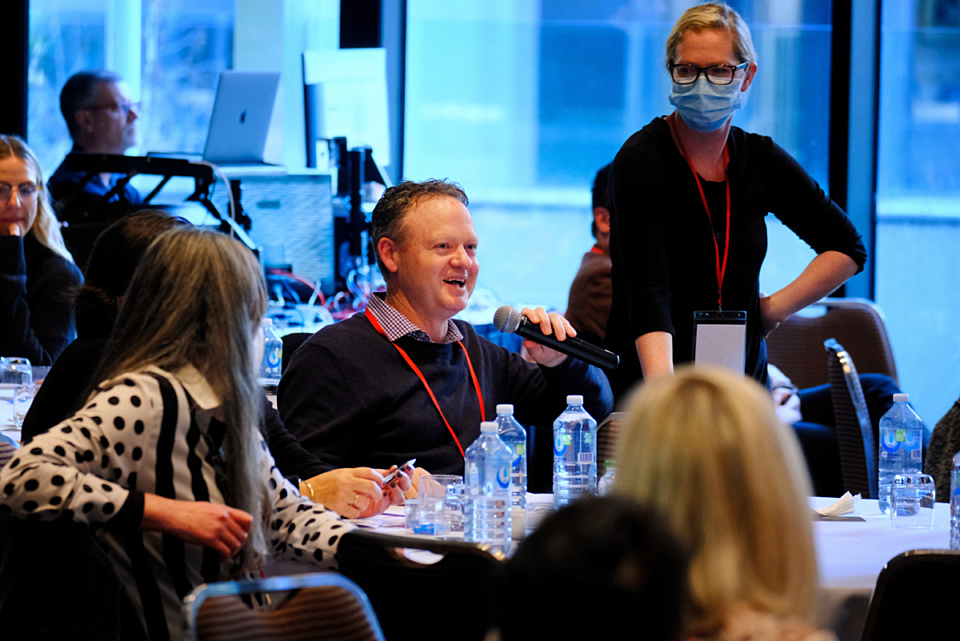Grants conference keynote: It’s time for pork barrelling to end
Posted on 02 Sep 2022
By Matthew Schulz, journalist, Our Community

Australian grantmakers at SmartyGrants’ annual conference for funders were the first to hear details of an independent think tank’s call for an end to pork barrelling.
In a keynote address to the Grantmaking Intelligence Conference a fortnight before the Grattan Institute’s report was released in August 2022, institute CEO Danielle Wood said it made sense that those at the frontline of grantmaking should be the first to know about its findings on the growing misuse of public money for political gain.
“I was quite delighted that the first foray into speaking about this was in a room full of grant nerds … there’s no better way to test the thinking than with genuine experts on the topic.”
The study catalogued the worst examples of federal and state funding being funnelled to marginal seats in an attempt to buy votes at a time when the country had seen a huge increase in perceptions of corruption.
The study found that of 19,000 grants in 11 programs from 2017 to 2021 under the former federal Coalition government, $1.9 billion went to Coalition seats and $530 million to Labor-held seats.
It also showed that across the nation’s three largest states, government seats won an average of $1 million each in grants, compared to about $300,000 for opposition seats.
Ms Wood said the grants more likely to involve pork barrelling shared common design features, such as being discretionary, and were far more likely to be awarded in marginal seats, especially at election time.
Grants prone to pork barrelling tended to be politicised, poorly selected, poorly administered and characterised by inefficiency.










The Grattan Institute report New politics: Preventing pork-barrelling found pork barrelling was becoming more common. It recommended a series of actions to prevent it, many of which grantmakers will have heard before, including:
- that grant programs should be open, competitive, and merit-based
- that ministers, while able to establish grant programs and define selection criteria, should not be involved in choosing grant recipients
- that a standing multi-party parliamentary committee should oversee compliance
- that funding for auditors-general should be increased to allow more frequent auditing.
While some of the worst examples had occurred under the past federal Coalition government, grants were also misused under state and federal Labor governments.
Ms Wood said pork barrelling might be legal, “but it is not good government”, and was damaging in multiple ways.
“It wastes taxpayers’ money, undermines public trust in our political leaders and institutions, and promotes a corrupt culture,” she said.
“Pork-barrelling is not new but is being normalised – some politicians now excuse it or even openly defend it.”
Ms Wood told the audience that some were surprised to see the Grattan Institute address a new area of research.
“A lot of people say, ‘Why is the Grattan Institute, which normally spends its time on health policy, or school education reform, or economic policy, why are you talking about this stuff?’
“And the answer really is something that sort of has built up through my eight years at Grattan … was that we saw that a lot of times, that what we thought was good policy that we were advocating for would fall over because of challenges in process. We wanted to say more about good government decision-making.”
Ms Wood said the institute’s latest report was one of three in its “New Politics” series addressing integrity, with the others covering political appointments and government advertising.
Ms Wood said it was alarming that Australia’s reputation had been damaged by increasing perceptions of corruption.
According to Grattan Institute’s report, Australia once ranked 7th in the world in terms of perceptions of corruption, but had dropped to 18th in less than a decade.
“Taking the pork off the table would improve the quality of public spending and strengthen our democracy,” Ms Wood said.
Quizzing Ms Wood after the presentation, delegates raised concerns about the scant likelihood that politicians would “do the hard thing” and relinquish their power to determine grants, worries that crucial natural disaster funding might be siphoned into the wrong pockets, the potential for community panels at the local level to reduce political interference, and the potential for concerned grant recipients to respond to perceived pork barrelling through the legal system.
In response, Ms Wood said she believed the desire for postitive change was at a high point in the wake of a new federal government. She said influential crossbenchers were keen to address such issues, and “integrity was front and centre”.
Constitutional law expert Professor Anne Twomey, in a report commissioned by the NSW Independent Commission Against Corruption (ICAC), recently called for the practice of pork barrelling to be made illegal.
(Media coverage: The Age | The Mandarin | AFR)